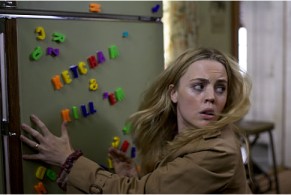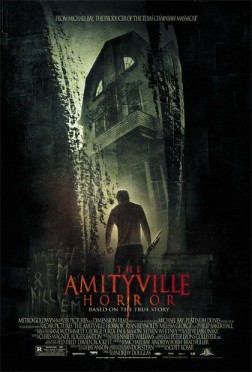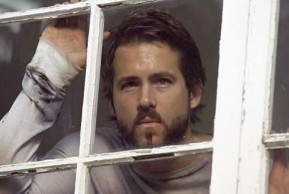|
The
Amityville Horror
remake (re•make): To make again or anew.
This
seems to be standard protocol for most Hollywood studios
these days, and on paper it makes sense. Dollars and cents.
Hell, if sold before you might as well try to cash in on
the property again, and it sure beats coming up with anything
original, right?
Well,
let’s be fair. Nothing is new or original in the studio
system anymore. With the term “original” applied
to various films which basically pay homage to countless
genre films from the past, it’s become quite clear
that true “originality” comes in the approach
of presenting the material, no matter how tired it may be.
Consider
Dawn of the Dead. The George A. Romero original
offered just the right amount of gore to appease horror
fans while finding something substantial to say about consumer
culture in a socio-political fashion. When news of a remake
circulated it sounded like yet another tawdry cash cow in
the works.
Then
it hit. Dawn of the Dead
was remade anew in 2004 at the hands of relatively unknown
director Zack Snyder, and surprise, surprise, it worked.
Albeit nowhere near touching ground trail blazed by the
original, Snyder and screenwriter James Gunn kept only the
essentials (zombies, survivors, and a mall) and made the
rest their own. All of this aside, the remake was as resounding
as its predecessor, but was still distinct enough to hold
its own.
So along
comes relative newcomer Andrew Douglas’ remake of
The Amityville Horror, and the result is a remake
that actually surpasses the original in some regards, despite
a few trappings that manage to fall flat. Along with screenwriters
Scott Kosar and Sandor Stern, Douglas approaches the remake
in less of a revisionist method, yet still manages to fix
a few complications from the original film.
One major
overhaul, and the weightiest gripe about the film, is the
bow to hyper-stylized flash cutting that is all the rage with
younger directors. Nothing establishes a creepy surreal tone
like longer, more uncomfortable takes, and a film like this
should be more about tone and unease than shock-schlock cutting
for effect.
The
opening sequence, detailing true-life murders of the DeFeo
family at the hands of their eldest son, is such an assault
to the senses that it is difficult to tell which offends
more, the act we are supposed to be horrified by or the
barrage of images and sound effects used to accentuate each
cut made.
Once
one wades through the muck, the film settles in, slowing
the breakneck pace from the initial onslaught in favor of
character development. George Lutz’s (Ryan Reynolds)
arc, especially, benefits from this decision in comparison
to the original film.
George,
portrayed deftly although surprisingly by Reynolds, is established
here as a widow’s new husband who desperately wants
to do the right thing in regards to his wife, Kathy’s
(Melissa George) children. George’s plight is portrayed
in such a way that prior to the move into the house, viewers
admire his efforts with young Billy (Jesse James), who adamantly
wants to hate him for stepping into the family.
George
never presses to replace the memory of Kathy’s ex,
and the pain on his face while trying to engage Billy despite
being cut down is very real and resonant, which is a big
surprise from Mr. Van Wilder. We see the strains on the
family before they even step foot in Amityville, and these
are the same strains that the spirits in the house exploit
during their twenty-eight day stay.
The
Lutz’s are informed of the DeFeo murders, and being
skeptics of the supernatural opt to move into the house
regardless. Financial woes play into this decision, considering
they could not afford such a house under any other circumstances.
As George becomes more and more detached from the family,
monetary pressure masks his shift in behavior. Karen seems
to equate George’s mood swings as product of the stresses
of making this venture work, not something as outlandish
as hearing voices in the late night hours.
 |
She
remains unaware of the late night murmurs pushing George
to the edge, and his lack of communication in this regard
doesn’t help. Take away the “spooky ghost and
ancient burial ground” logic, and beneath is a situation
that commonly troubles younger married couples: lack of
communication pulls apart relationships. This serves as
a metaphor for the deterioration of the American Family
in a similar fashion that The Exorcist riffed on
the effects of a divorce on mother-daughter relationships.
This
leads us to one of the major flaws in the original, lack
of character development coupled with some illogical plot
points. In the original, George is never established as
a caring figure, so when he begins acting irrational, we
know he is likely under the influence of the house, but
we aren’t given anything to compare his harsh punishments
to.
Also,
the process of discovery should lead to logical decision
making within the confines of character. Karen’s research
into the house’s history leads to finding after finding
that would have prompted any normal family to reconsider
their stay before anything truly disturbing had even transpired.
The remake slows this progression, and Karen doesn’t
really begin clueing into what could be at stake until it
is too late which builds to a more cathartic and emotionally
logic third act setup.
Overall,
the film maintains the look and feel of the seventies without
stooping to self-reflexive inferences. Even the film stock
is grainy, recalling the gritty cinematic aesthetic of horror
films from that era. Now if only these directors could learn
that with precision framing, attention to mood, and establishment
of tone, the need for rapid fire splicing is rendered unnecessary.
Rating:

|








